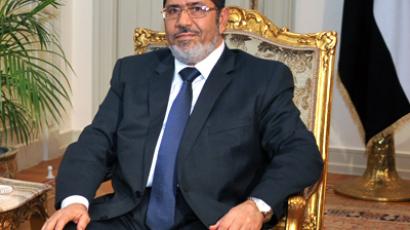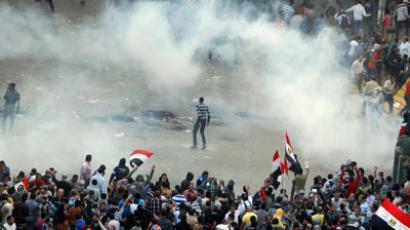No amendments to Morsi decree after meeting with top judges
Egyptian President Mohamed Morsi has met with the country’s top judges to reassure them that last Thursday's decree granting him sweeping powers is “temporary” and limited only to “sovereignty-related issues.”
According to a presidential spokesman, no amendments were made to the decree after the meeting, Al-Ahram newspaper reported. The talks with the Supreme Judicial Council (SNJ) come as demonstrators in Cairo continue a week-long sit-in protesting the Morsi's move to grant himself near-absolute powers, including immunity from judicial oversight.Meanwhile the ruling Muslim Brotherhood party has announced that it has canceled a massive pro-Morsi rally to avoid “public tension.”The president told the judges that he acted within his rights when issuing the decree, and that the declaration did not "infringe" on the judiciary, according to Morsi's spokesperson, Yasser Ali.On Sunday, the SNJ said the declaration – which shields Morsi’s decisions from judicial review – must only be applied to “sovereign matters,” suggesting that the council does not completely reject the decree.However, an earlier statement from the council took a harsher tone, calling the decree “an unprecedented attack on the independence of the judiciary and its rulings.”
The fact that Morsi said his decree will be limited only to “sovereignty-related issues” should not be seen as a concession to the judiciary, says Eric Draitser, geopolitical analyst for StopImperialism.com.“This is mainly to placate the people who are angry and are in the streets,” he told RT, stressing that despite the Muslim Brotherhood's victory in the election last year, many elements within Egypt are very much dissatisfied with the new rulers – and would prefer changes to the country's political structure.
Meanwhile, protesters in Cairo’s Tahrir Square say amending the declaration simply won’t do. They intend to continue demonstrating until the entire decree is scrapped. "We demand the president opens a dialogue with all political powers in Tahrir Square and rescinds his new declaration," protester Khaled Khalil told AP. Former presidential candidate Hamdeen Sabahy has launched a movement called the Popular Current and joined several other opposition leaders denouncing the decree."Our decision is to continue in the square, we will not leave before this declaration is brought down," he said in a statement. He added that Tahrir Square would be a model of an "Egypt that will not accept a new dictator because it brought down the old one."But others say Morsi’s actions are a far cry from those of a dictator. “If a dictator wants to speed up the work of the commission draft of the constitution and is aiming to reinstate a democratically elected parliament to give up the legislation which was forced upon him by the staff, then I would welcome any dictatorship,” deputy editor of Al-Ahram newspaper, Yehia Ghanem, told RT. Minor clashes took place in Tahrir Square Monday morning, as the sit-in continued for its third consecutive day. In previous days, both supporters of the Muslim Brotherhood and those opposing Morsi protested throughout Cairo and several other Egyptian cities. The two sides clashed with one another, and with police officers. Around 500 people have been injured in various clashes since Morsi’s announcement. The demonstrations also led to the death of 15-year-old boy on Sunday.Despite recent tension between protesters and police, officers allowed mourners to pass through Tahrir Square on Monday for the funeral of a demonstrator killing during clashes with officers.An informal truce was called between police and anti-Morsi protesters, and the procession went ahead peacefully.
But as the protests against the decree continue, journalist and author Neil Clark says there’s more to the demonstrations than meets the eye. “The underlying causes are economic factors. People voted for Morsi because they thought he’d bring changes in. But the economy’s gotten worse. One in four young Egyptians are out of work. Poverty is on the rise. So there is the constitutional crisis, but beyond that there are deeper issues which have to be addressed,” Clark told RT.On Sunday, Morsi stressed to the public that his powers were “temporary,” saying he wanted to begin talks with political forces. The statement marked the first time Morsi had mentioned any sort of temporary nature to his new powers – prompting many to speculate that the leader is simply backpedaling in response to the protests.But Clark says Morsi can’t be trusted – and Egyptians are already familiar with so-called “temporary” powers that are anything but.“Egyptians have heard this before. They’ve had a lot of temporary powers down the years, where governments said they’re doing something on a temporary basis and its ended up lasting a very long time… so I think there is that sort of fear among Egyptians – that what they’re getting is a new pharaoh,” he said. Clark says that Morsi’s recent peace brokering in Gaza may have given him the confidence to issue the decree, believing it would be met with support. “I think the words of praise he got from the US about his peace brokering in Gaza went to his head. He thought he was in a very strong position, so he announced [the decree], but it’s all backfired. I think it’s taken him by surprise, just how much opposition there is to his announcement. So he’s now realized he’s got to back down,” he said.Morsi's Thursday decree states that no laws or declarations passed by the president from the time of his inauguration until a new parliament is elected can be overturned by any authority, including the judiciary.He extended the same protection to parliament's upper chamber along with the panel currently drafting a new constitution – both of which are dominated by his Islamist allies.Morsi’s supporters say the move was necessary in order to prevent the courts from disbanding the assembly and writing the new constitution themselves. However, Egyptian opposition leader Mohammed ElBaradei has accused Morsi of behaving like a “new pharaoh.”














